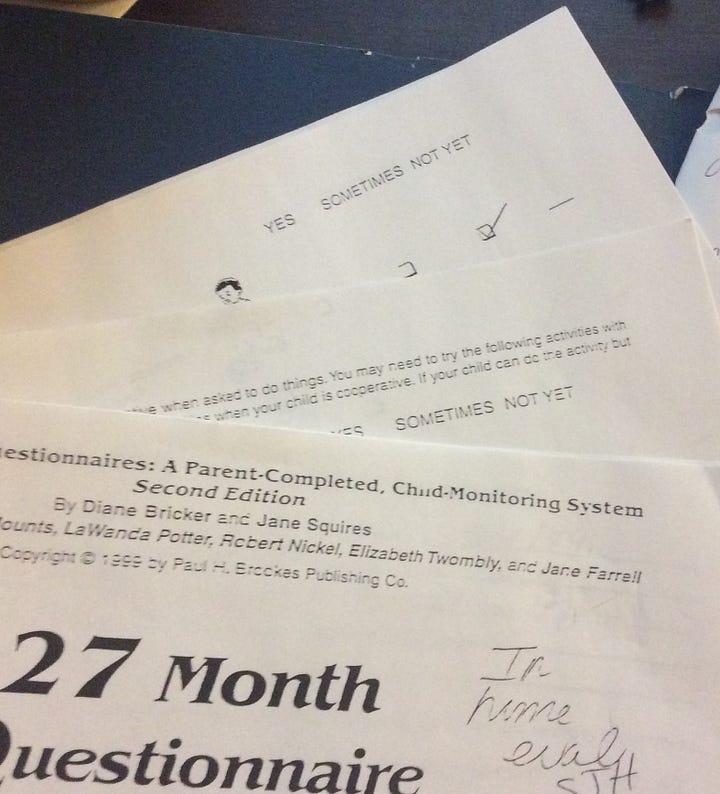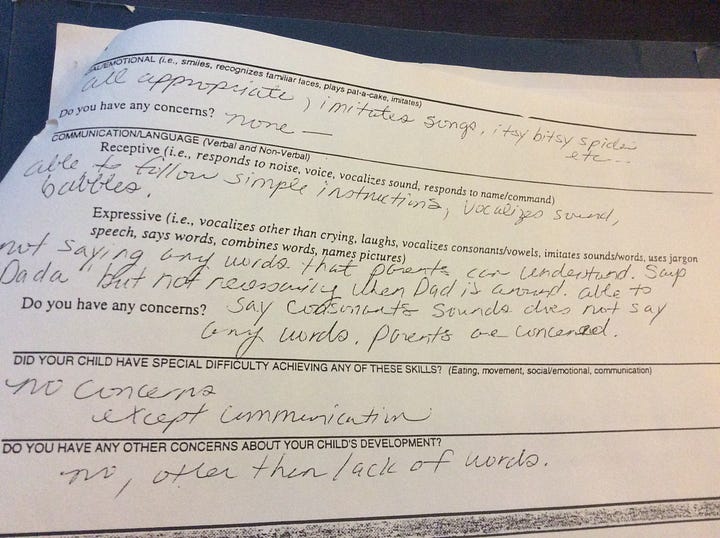Even though I knew my son wasn’t talking on time,
That first assessment still hit me hard.
We had set up a screening with our state’s early intervention program. Although our "wait and see" pediatrician had finally given us a referral, the only developmental specialist in our area didn’t take our insurance and had a months-long wait.
But luckily, I had friends who told me what our doctor had neglected to say. Through the early intervention program, we could get a free speech evaluation—and if our son qualified, on-going speech therapy.
The parent-interview notes from the initial screening show that I reported “no concerns” in any area, except for speech. I was surprised when her simple checklist of motor, speech, and social skills revealed that, in fact, my 27-month-old qualified for services in multiple areas.


The first developmental assessment in our home would follow in a few weeks. I sat on the couch with the evaluators, fielding questions about my kid that became progressively harder to answer. I watched as they failed in almost all of their attempts to engage with my son playing on the carpet nearby. I kept apologizing—he’s being shy…he doesn't know you, but he plays with us…oh, he can usually do that…he’s kind of stubborn…sorry.
I expressed my concerns about his speech delay but they had lots of other questions.
I explained his quirky ways of playing, that although he could place shapes in a sorter or complete a simple puzzle, “he is more interested in taking all the pieces out and making a big pile with them.” They noted his lack of pretend play, and his inability to point or use a tool to get items that were out of reach.
I off-handedly told them about his lack of interest in the other kids at his twice-weekly toddler “preschool.” That the teachers reported he was having some trouble with transitions. That it took weeks to drop him off without tears.
I laughed as I described how we didn’t turn on the vacuum without warning him. He didn’t like fingerpaints, and he was a bit of a “picky” eater. And, oh, my boy really loved to swing.
When we received their report a few weeks later, I wasn’t surprised to see that his speech/language skills were severely delayed. That was the reason I called them.
But the report told a more complex story than I was expecting.
… difficulties in the personal/social domain
… sensory integration issues
… areas of concern in adaptive, fine motor, and problem solving
The results were not equivocal in the least. My son was not borderline, he was not “at risk” – he had significant delays. Across every category.
I felt so guilty that I’d missed all those signs. It was embarrassing, and eye-opening, to have strangers tell me what I hadn’t recognized in my own child.
“Global delays,” the report said. For him. And, for me.
On the heels of that first assessment, more evaluators would come. Weekly therapies would begin. In six months, we finally had an appointment for an official psychological evaluation. But that first report was the roughest.
Even though I have binders full of reports now,
even though he’s come a long way and so have I,
even though this quirky life is just our ‘normal’ now—
That first assessment still hits me hard.
2025 note: This piece first appeared on my blog in April 2016, as part of a series in honor of Autism Awareness Month. At the time, I noted: As the parent of an autistic teenager, it’s hard to remember a time when I wasn’t “aware” of autism, since it is such an integral part of our everyday life. But there was a time – in fact, the majority of my life – when I did not know anything about autism. Throughout April, I’ll be sharing a few moments from the months and years just prior to my son’s diagnosis, when the pieces of the "awareness" puzzle were just clicking into place for me.

